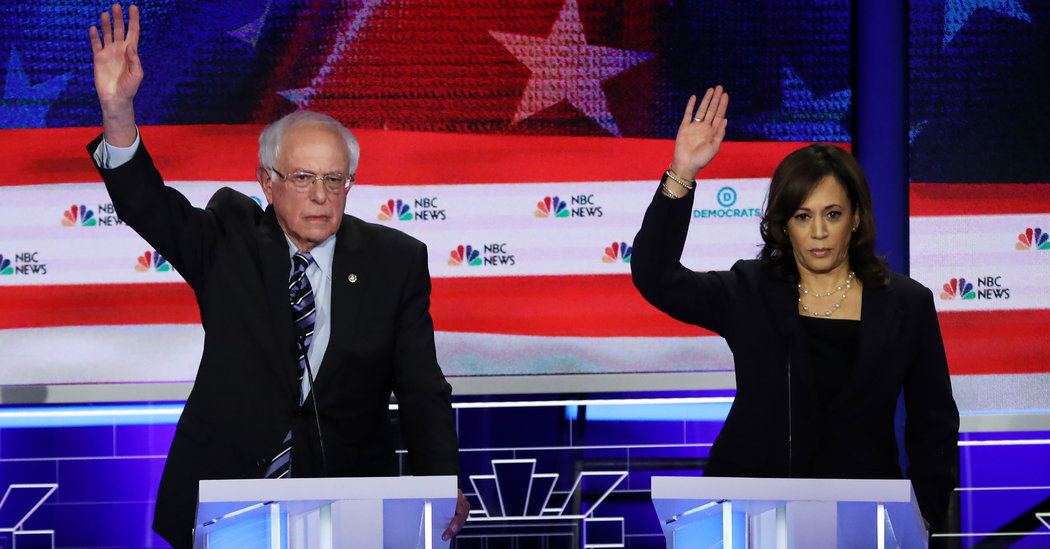
On the debate stage Thursday, Senator Kamala Harris raised her hand, seemingly in support of a government insurance proposal that would eliminate employer insurance. On Friday, she said she had misunderstood the question.
The wording of the question left room for confusion, but Ms. Harris also has a history of making conflicting statements on the issue. In a CNN town hall in January, she said she’d favor eliminating all private health insurance. The next day, her campaign walked it back.
A single-payer health plan requires people with other forms of comprehensive health insurance to switch. That is a politically risky position. Some Democrats have hedged by backing more gradual, optional expansions of public coverage. Others have decided that they can persuade voters that the advantages outweigh the disruption. Ms. Harris, so far, hasn’t chosen either one.
Surveys show that most Americans — and a substantial majority of Democrats — back a single-payer system in which the government provides health insurance to everyone. But when surveys ask them if they’d still like that idea if they had to give up their insurance, many change their minds. Surveys asking people if they could keep their insurance under such a plan find many who say yes.
Senator Bernie Sanders of Vermont, who has supported a single-payer plan for decades and is the author of the Medicare for All Act, which Ms. Harris has co-sponsored, argues that support will increase as more voters learn about the benefits of his plan. Insurance under Medicare for all, he argues, will cover all doctors and hospitals, and include no co-payments or deductibles. He thinks such a plan has so many advantages that few Americans would remain attached to their current coverage once they understand it.
Some Democratic strategists look at the polls and worry about a backlash to the major disruptions such a plan would create. Candidates like Senator Michael Bennet of Colorado and the former vice president, Joe Biden, say they’d prefer a system in which people could choose to buy public insurance if they want — or keep the plan they have.
Medicare for all was once cast as a litmus test for the Democratic field, but at this point most of the candidates favor this sort of optional approach, with a mix of public and private insurance.
Most candidates in the field endorsed such a plan in a recent New York Times survey, and in the debates’ less formal vote by show of hands.
Another solution might be government plans that cover some things, but allow people to buy private insurance for extras. In other countries with a universal public plan and private insurance, private insurance is there to fill holes in the government system. In Canada, private insurers pay for prescription drugs, which Canadian Medicare does not cover. In Britain, private insurance can get you extra services and the ability to jump the line for certain treatments. In the United States today, older people on Medicare buy supplemental insurance to help cover deductibles and co-payments charged by the government system.
Several candidates who have signed on to Medicare for all legislation suggested they would like to preserve “a role” for private insurance, and these vague statements could point to such a public-private system.
But such a policy stance may not reassure people who are reluctant to give up their current insurance arrangements. It could offer both the disruption of Medicare for all, and the inconvenience of private insurance, in one package.
The debate question left open an alternative interpretation. “Many people watching at home have health insurance through their employer,” said Lester Holt, the NBC anchor and one of the moderators. “Who here would abolish their private health insurance in favorite of a government-run plan?” Ms. Harris later said she thought the “their” meant her, and not the people watching at home.
But in recent answers to a detailed New York Times survey on her health care policy preferences, Ms. Harris also positioned herself on the single-payer side of the line. When asked if she’d favor a plan that abolished private insurance, she said yes. When asked if she’d prefer a Medicare for all plan or an optional proposal, which she also endorsed, she said, “Medicare for all.”
“Medicare for All will extend health insurance to every single American, with no co-pays or premiums,” she wrote. “It will cover most procedures, as well as dental, vision and hearing aids, and will allow you to choose your doctor, without worrying about who’s in-network or not. We have to change a system that allows big insurance companies to put profit over people’s health.”
On Friday morning, she told the hosts of the MSNBC show “Morning Joe,” “No, I do not” support abolishing private insurance. “The question was would you give up private insurance for that option, and I said yes.”
It is hard to reconcile those positions.

